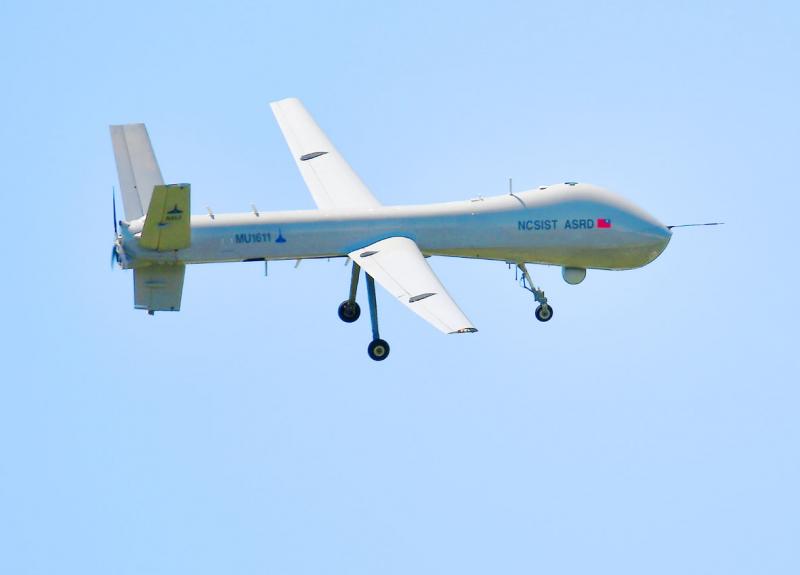The indigenous Tengyun, an uncrewed tactical reconnaissance and combat drone, is expected to enter mass production by 2024, Ministry of National Defense (MND) officials told a meeting of the legislature’s Foreign Affairs and National Defense Committee yesterday.
Asked by Democratic Progressive Party Legislator Chuang Jui-hsiung (莊瑞雄) about the time line for the drone’s rollout, Deputy Minister of National Defense Chang Che-ping (張哲平) said that the Tengyun would have to undergo testing before it can be mass produced.
Developed by the Chung-Shan Institute of Science and Technology, the drone completed its initial test flight in April 2018.

Photo: Yu Tai-lang, Taipei Times
Evaluations of military operation capabilities are required before production can start, Chang said, adding that the process would take about one-and-a-half years.
Institute deputy director Lo Yi-chung (羅意中) said that an integration system for drone equipment — such as photoelectric sensors and radars, which are domestically produced — is still under development.
Research and development of the system would be arranged in the first half of next year, before combat assessments of the drone in the second half, Lo said, adding that mass production could begin in 2024.
Asked if the US’ announcement that it would sell four MQ-9B SeaGuardian drones to Taiwan would affect the development of the Tengyun, Chang said that the two drones have different functions.
The US Department of State on Nov. 3 approved the sale of four MQ-9Bs, related equipment and personnel training to Taiwan for US$600 million.
The MQ-9B is a strategic drone with high flight endurance and long-range reconnaissance capabilities, Chang said, adding that the US model would complement the Tengyun, which is a tactical drone.
Meanwhile, Air Force Chief of Staff Lieutenant General Huang Chih-wei (黃志偉) said that the number of daily test flights for the Yung Ying (勇鷹, Brave Eagle), the nation’s first indigenous advanced jet trainer, have increased from one to two.
The increase came after Minister of National Defense Yen De-fa (嚴德發) early this month promised to negotiate a new testing schedule with the Civil Aeronautics Administration, which initially allocated just 70 minutes per day for test flights, due to tight air space arrangements.
Additional flights from 3:30pm to 4:30pm would be allowed, and another session from 11:40am to 12:40pm would be added next year, Huang said.
The military commissioned the government-owned Aerospace Industrial Development Corp (AIDC) to produce 66 Yung Yings by 2026 as part of efforts to boost the nation’s defense capabilities.
Asked by legislator and Chinese Nationalist Party (KMT) Chairman Johnny Chiang (江啟臣) when testing of the Yung Ying would be finished and production would start, an AIDC employee, who declined to be named, said that the production might start as early as November next year.

The Chinese military has built landing bridge ships designed to expand its amphibious options for a potential assault on Taiwan, but their combat effectiveness is limited due to their high vulnerability, a defense expert said in an analysis published on Monday. Shen Ming-shih (沈明室), a research fellow at the Institute for National Defense and Security Research, said that the deployment of such vessels as part of the Chinese People’s Liberation Army (PLA) Navy’s East Sea Fleet signals a strong focus on Taiwan. However, the ships are highly vulnerable to precision strikes, which means they could be destroyed before they achieve their intended

About 4.2 million tourist arrivals were recorded in the first half of this year, a 10 percent increase from the same period last year, the Tourism Administration said yesterday. The growth continues to be consistent, with the fourth quarter of this year expected to be the peak in Taiwan, the agency said, adding that it plans to promote Taiwan overseas via partnerships and major events. From January to June, 9.14 million international departures were recorded from Taiwan, an 11 percent increase from the same period last year, with 3.3 million headed for Japan, 1.52 million for China and 832,962 to South Korea,

SOVEREIGNTY: The rigs show that Beijing ‘rejects Taiwan’s jurisdiction’ by building in areas where Taipei demands permission to build or alter installations Chinese oil rigs have been sighted just 26 nautical miles (42km), from Taiwan’s exclusive economic zone (EEZ) near Pratas Island (Dongsha Island, 東沙島), posing a threat to Taiwan’s sovereignty if left unchallenged, a brief published by the Jamestown Foundation on Tuesday said. Pratas Island, 444km from Kaohsiung, is northeast of the South China Sea and houses a Taiwanese garrison. The brief, titled “Rigging the Game: PRC Oil Structures Encroach on Taiwan’s Pratas Island” — referring to the People’s Republic of China — analyzed photographs and said that Beijing’s tools to pressure Taiwan now include oil rigs. “Oil rigs now constitute part of Beijing’s

The Taiwan Experience Education Program (TEEP) has funded short-term internships in Taiwan for more than 4,500 young people from more than 40 countries since 2015, with the goal of attracting and retaining international talent, the Ministry of Education said yesterday. Fifty-five colleges launched 514 projects this year, including in fields such as semiconductors, artificial intelligence, medicine and biotechnology, green energy, and sustainability, it said. The program provides research and practical internships in Taiwan for two to six months, and offers cultural exchange and networking opportunities, the ministry said. For example, National Formosa University’s Embedded System and Autopilot Laboratory developed two solar-powered drones in